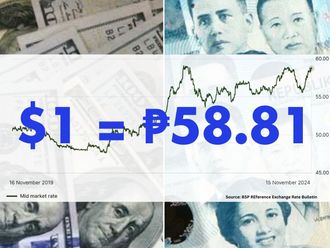Athens: Greece has overcome the danger of an ignominious euro exit, but it must stay the course of tough reforms to avoid a “relapse”, Prime Minister Antonis Samaras said Sunday.
“I believe the great danger [of a euro exit] has passed,” Samaras said in an interview with the To Vima weekly. “Drachmaphobia seems to have receded completely.”
But Samaras, whose three-party government faces another reform hurdle in parliament next week, warned the nation: “There can be no letup in our effort, because there is the risk of a relapse.”
The government last week pushed through parliament a tax bill introducing new annual income thresholds for salaried taxpayers and scrapping tax breaks for the self-employed, a category blamed for a large part of the tax evasion that has plagued state finances for decades.
On Monday, it will seek approval for another round of reform legislation tied to Greece’s next slice of EU loans.
The opposition has condemned the measures as a new attack on the embattled middle class which is bearing the brunt of a fourth straight year of austerity.
Defections
Samaras’ administration has been hit with several defections in the past few weeks in opposition to the continued austerity wave.
The coalition government has lost 16 deputies since coming to power in June, but still retains a nominal majority of 163 in the 300-seat parliament.
The latest umbrella bill introduces closer state budget monitoring and gives greater flexibility to banks to raise fresh capital. It also regulates civil service pay cuts and layoffs and finalises a state debt buyback.
European Union leaders last month agreed to hand out €49.1 billion (Dh235.7 billion, $65 billion) in aid in return for more austerity measures.
Athens has already received €34.3 billion of this package and is poised to get another €9.2 billion at the end of this month if key fiscal reforms are carried out, followed by two more slices of €2.8 billion in February and March.
European finance ministers are to meet on January 21 to decide whether to authorise the next payment.
The International Monetary Fund, which is participating in Greece’s rescue, is also expected to decide this month whether to release its next share of the bailout, worth an additional €3.4 billion.












